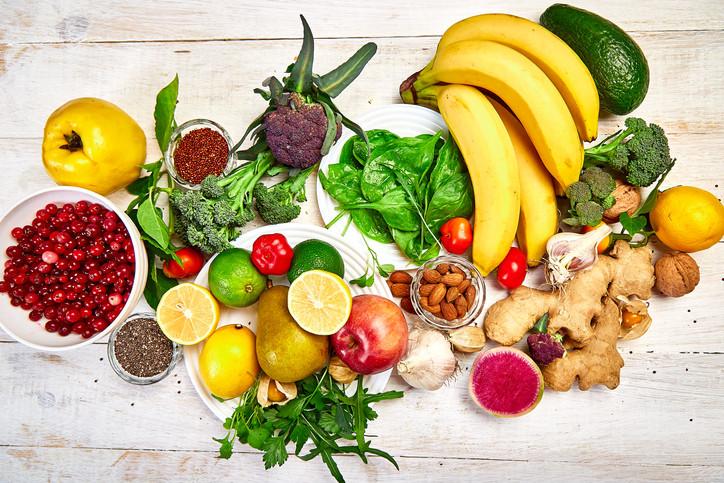Introduction
Vitamins are essential nutrients that play a vital role in maintaining good health. They are organic compounds required in small amounts for various bodily functions. This blog aims to provide insights into the food sources of vitamins and how they work within the body to support overall well-being.
Understanding Vitamins and Their Importance
Vitamins are micronutrients that the body needs to function properly. They are categorized into two groups: fat-soluble vitamins (A, D, E, and K) and water-soluble vitamin (B-complex vitamins and vitamin C). Each vitamin has unique functions and benefits for the body.
Food Sources of Vitamins
Vitamin A: Found in foods such as carrots, sweet potatoes, spinach, kale, and liver. It is essential for vision, immune function, and healthy skin.
Vitamin D: Sunlight is the primary source of vitamin D, but it can also be obtained from fatty fish (salmon, mackerel), fortified dairy products, and egg yolks. Vitamin D is crucial for calcium absorption, bone health, and immune function.
Vitamin E: Nuts and seeds (almonds, sunflower seeds), spinach, broccoli, and vegetable oils (olive oil, sunflower oil) are excellent sources of vitamin E. It acts as an antioxidant, protecting cells from damage, and supports immune function.
Vitamin K: Dark leafy greens (kale, spinach), broccoli, Brussels sprouts, and green peas are rich in vitamin K. This vitamin is necessary for blood clotting and bone health.
B-Complex Vitamin: Found in whole grains, legumes, nuts, seeds, dairy products, meat, and leafy greens. B-complex vitamins (B1, B2, B3, B5, B6, B7, B9, B12) play a crucial role in energy production, nervous system function, red blood cell formation, and brain health.
Vitamin C: Citrus fruits (oranges, lemons), berries, kiwi, bell peppers, broccoli, and tomatoes are excellent sources of vitamin C. It is essential for immune function, collagen production, and antioxidant protection.
How Vitamin Work in the Body
Vitamin Nutritional function as coenzymes or precursors to coenzymes, which are necessary for various enzymatic reactions in the body. They participate in metabolic processes, support cellular function, and act as antioxidants, protecting cells from damage caused by free radicals.
When consumed through food or supplements, vitamin are absorbed during digestion and transported to different tissues and organs. Each vitamin performs specific functions, such as supporting immune function, aiding in energy production, promoting healthy skin and hair, facilitating bone health, and maintaining overall well-being.
Meeting Your Dietary Vitamin Requirements
To ensure adequate vitamin intake, it is important to consume a balanced diet rich in nutrient-dense foods. Include a variety of fruits, vegetables, whole grains, lean proteins, and dairy products in your daily meals. A diverse diet will provide a wide array of vitamin and minerals necessary for optimal health.
However, in some cases, dietary restrictions, medical conditions, or specific lifestyle factors may require supplementation.
When considering vitamin supplementation, it is best to consult with a healthcare professional or registered dietitian who can assess your individual needs and guide you accordingly. They can help determine if you have any specific deficiencies and recommend appropriate supplements or dietary adjustments.
It’s important to note that while vitamins are essential for health, more is not always better. Excessive intake of certain vitamins, particularly fat-soluble vitamin, can lead to toxicity. It is crucial to follow recommended daily intake guidelines and avoid megadoses without medical supervision.
Additionally, certain factors can affect the absorption and utilization of vitamins in the body. These include age, underlying health conditions, medications, alcohol consumption, and smoking. By addressing these factors and adopting a healthy lifestyle, you can optimize your body’s ability to absorb and utilize vitamin from the foods you consume.
Meeting Your Dietary Vitamin Requirements for Optimal Health
To ensure that you meet your dietary vitamin requirements for optimal health, it is essential to focus on consuming a variety of nutrient-rich foods. Incorporate the following tips into your daily routine:
- Include a Rainbow of Fruits and Vegetables: Different fruits and vegetables provide a wide range of vitamins. Aim to include colorful options like berries, citrus fruits, leafy greens, bell peppers, and sweet potatoes in your meals. This way, you can benefit from a diverse array of vitamins and antioxidants.
- Choose Whole Grains: Whole grains such as quinoa, brown rice, whole wheat bread, and oats contain B-vitamins that support energy production and brain health. Opt for whole grain options over refined grains for a nutrient boost.
- Don’t Forget Lean Proteins: Include lean sources of protein like poultry, fish, tofu, legumes, and nuts in your diet. These foods provide not only protein but also B-vitamins like B6 and B12.
- Incorporate Healthy Fats: Include sources of healthy fats like avocados, nuts, seeds, and olive oil. These foods provide vitamin E, which acts as a potent antioxidant.
- Consider Fortified Foods: Fortified foods such as fortified dairy products, cereals, and plant-based milk alternatives can be good sources of vitamins like vitamin D and B12.
Remember that a well-balanced and varied diet should be the primary source of vitamins. While supplements can be helpful in certain situations, they should not replace a healthy diet.
By prioritizing nutrient-dense foods, you can ensure that your body receives a wide range of vitamins necessary for optimal health. Consult with a healthcare professional or registered dietitian to address any specific dietary concerns or to determine if vitamin supplementation is necessary. With a focus on wholesome, diverse, and nutrient-rich foods, you can support your overall well-being and enjoy the benefits of a vitamin-rich diet.
In conclusion, vitamins are vital for maintaining optimal health and well-being. Obtaining vitamins from a balanced diet that includes a variety of nutrient-rich foods is the ideal approach. Understanding the food sources of vitamins and their functions allows you to make informed choices when it comes to your dietary intake. Remember, a wholesome diet, along with regular physical activity and other healthy lifestyle practices, contributes to overall vitality and supports your body’s vitamin needs.
Visit : healthystories.net


6 thoughts on “Vitamins are obtained from which foods? And how does it work?”